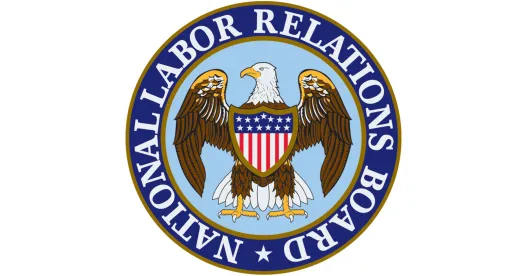The majority of unfair labor practice (ULP) charges against employers are either withdrawn, dismissed or settled. My February 7, 2014 article discussed the former general counsel’s (GC) 2011 mandate (GC Memo 11-04) requiring National Labor Relations Board (NLRB) Regional Directors to include “default language” in every informal settlement agreement. Employers and their counsel face significant potential issues when a default provision is inserted in such agreements. Among other things, a default provision gives the NLRB the right to revoke the entire settlement if a Regional Director finds, after an investigation, that future unfair labor practice charges have arguable merit.
The case I discussed in that earlier article settled with a non-admissions clause (and no default language) after some helpful intervention by a sympathetic administrative law judge. The uncertainty created by default language lead me to observe that savvy labor counsel must “think outside the box to protect and balance clients’ short and long term interests.” As discussed below, the NLRB’s continued obsession with default language in informal settlements requires management counsel to implement creative solutions to protect employer rights.
Danger Ahead: Default Language in a Board Settlement Agreement Constitutes a Waiver of Employer Rights
In NLRB parlance, a “default” is a post-settlement unfair labor practice that breaches the terms of a prior settlement agreement. A default results in the revocation of the settlement and an unreviewable finding that the employer committed the violations alleged in the settled case. A default results in a waiver of the employer’s right to defend the allegation. In other words, the Board revokes the settlement, finds the employer guilty of the settled allegations and imposes a full remedy. Another problem with default language is that it encourages unions and individual employees to file more ULP charges in the hope that something “will stick,” triggering a default under the settlement. Critically, NLRB Regional Directors unilaterally determine whether a complaint should issue on post-settlement charges.
Because default language in a settlement places employers on the precipice of serious consequences, management labor lawyers consider such provisions to be unnecessarily punitive and, therefore, prosecutorial overreach by a hyper partisan Board. Indeed, the Obama Board doubled down, encouraging these tactics in the 2016 decision in Postal Service, 364 NLRB No. 116 (2016). That case completely removed all of the discretion administrative law judges had possessed for decades to evaluate proposed settlement agreements under the standards set forth in the Board’s seminal decision Independent Stave. Simply put, under Postal Service, the only settlement a judge could accept was complete capitulation by the employer on every allegation contained in the Regional Director’s complaint. The elimination of the parties’ ability to compromise disputed claims effectively thwarted good faith efforts to settle even garden-variety ULP cases.
Current Board Policy Disfavors But Does Not Specifically Prohibit Default Provisions in Informal Settlements
The current Board correctly recognized that administrative law judges could not perform their traditional judicial function under the restrictions set forth in Postal Service. In late 2017, the Trump Board overruled Postal Service in UPMC, 365 NLRB No. 153 (2017). The UPMC decision revived the Board’s long standing policy of, quoting the UPMC Board, “encouraging the peaceful, nonlitigious resolution of disputes,” which promotes “industrial harmony” and avoids the “risks inherent in protracted litigation.”
Shortly thereafter, on December 1, 2017, General Counsel Peter B. Robb issued his own directive to the agency, GC Memorandum18-02, rescinding the mandatory default language requirement. At that point, both the Board and the agency’s chief enforcement officer had made their positions regarding settlement and the content of settlement agreements clear.
The relief many management labor practitioners felt from this sensible guidance was short lived. Some Regional Directors are ignoring the general counsel’s admonition and continue to seek default language in informal settlements, even in cases where a company had never been found to have committed even a single unfair labor practice in the past. Thus, the prosecutorial overreach the Board and the general counsel attempted to curb continues unabated in some NLRB Regions.
Protecting Employers From Prosecutorial Overreach
I recently handled two cases before the NLRB where the Regional Director insisted on including a default provision as a condition of an informal settlement. Both cases involved “garden variety” unfair labor practice claims. There were no allegations that any employees were unlawfully discharged or disciplined, no claim of unilateral changes, and no allegations of employer misconduct during a union organizing campaign. In fact, the employer in both cases had long-standing collective bargaining relationships with different labor organizations and multiple successive labor agreements.
Despite these facts, and that neither case was a “nip in the bud” situation and did not involve similar “hallmark” alleged violations, the Regional Director continued to insist on the inclusion of default provisions in the informal settlement agreements. The Regional Director would thereby maintain authority to determine whether the settlements were breached by some alleged bad act by the employer in the future and, accordingly, issue a new complaint. Thankfully, the Board’s Rules and Regulations, together with recent NLRB case law, provides an effective remedy when efforts to reasonably resolve a case are stymied by overly aggressive enforcement efforts.
Motions to Accept Settlements Under Section 102.25 of the Board’s Rules
Section 102.25 of the Board’s Rules and Regulations permits administrative law judges to rule on motions filed by employer counsel requesting that the judge accept a proposed settlement that is fair and reasonable. Such a motion can be made even if the charging party union and/or the Regional Director disagree with the proposed settlement terms. Motions can be filed before the trial date and even on the record on the day of the trial. One of the many benefits of such a motion is that counsel has the ability to develop a customized settlement proposal addressing the circumstances unique to each case. Customization can include the terms of the settlement agreement as well as the notice proposed to be posted at the work place.
In both cases discussed above, two different administrative law judges granted similar motions and accepted proposed settlements over the strenuous objection of the Regional Director. In the first case, a motion was filed with the administrative law judge weeks before the scheduled trial date with oral argument conducted telephonically. The ALJ reserved judgment and issued a well-written decision approving the proposed settlement agreement as well as the contents of a customized notice posting.
In the second case, the motion to accept a proposed settlement was made on the first day of trial after the employer and union agreed to certain settlement terms. The Regional Director again objected to the negotiated settlement and insisted upon including a default provision. The administrative law judge concluded that the proposed settlement was reasonable, granted the motion, and accepted the settlement on the record. Both approved settlements contained a non-admissions clause and did not contain any “default language.”
Key Takeaways for Employers and Their Counsel
The policy of the current Board and general counsel is to once again encourage the voluntary resolution of unfair labor practice charges where possible. In UPMC, the Board removed a primary obstacle to settlement by returning to administrative law judges the ability to analyze all settlement agreements under the reasonableness standard set forth in Independent Stave. Moreover, a settlement no longer needs to constitute total capitulation by employers on every allegation contained in a Regional Director’s complaint.
As made clear by General Counsel Robb in GC Memo 18-02, default language in informal settlements is no longer mandatory. Although Regional Directors continue to maintain discretion concerning settlement terms, such discretion must be exercised within the guidelines set by the Board. A Regional Director’s position regarding settlement is a factor to be considered, but it is not the only factor for the ALJ to consider. Prosecutorial overreach can once again be brought to the attention of the administrative law judge prior to or during a hearing.
Employers, particularly those with no history of prior unfair labor practices, are no longer required to accept default language in informal settlement agreements. Any insistence by the various Regions of the NLRB to include such a provision, with its attendant waiver of rights, should be scrutinized carefully. All parties including employers, unions, and the Board benefit when reasonable settlements address the risks and expense of litigation. Management counsel must continue to be ever vigilant to develop and implement creative solutions to protect employer rights.




 />i
/>i

